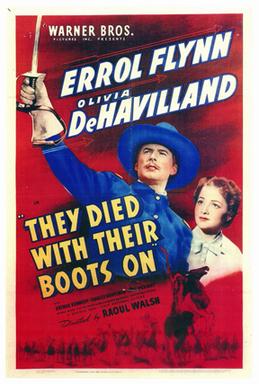"They Died with their boots on" (1941)

One of Hollywood's most legendary movie, with Errol Flynn as General Custer and Olivia DeHavilland as Libbie.
| They Died with Their Boots On | |
|---|---|
 | |
| Directed by | Raoul Walsh |
| Produced by | Hal B. Wallis Robert Fellows |
| Written by | Wally Kline and Æneas MacKenzie (screenplay) |
| Starring | Errol Flynn Olivia de Havilland |
| Music by | Max Steiner |
| Cinematography | Bert Glennon |
| Editing by | William Holmes |
| Distributed by | Warner Bros. |
| Release date(s) | November 21 |
| Running time | 140 min. |
| Language | English |
| 1941 | |
They Died with Their Boots On is a 1941 western film directed by Raoul Walsh and starring Errol Flynn and Olivia de Havilland. Despite being rife with historical inaccuracies, the film was one of the top-grossing films of the year, being the last of eight Flynn-de Havilland collaboration. The scene in which Custer and his wife part for the last time was the final scene that Flynn and De Havilland would appear in together, and the fact that they were aware of this added to the poignancy of the scene.
//
Plot
Custer is portrayed as a fun-loving but almost saintly figure who tirelessly works for Indians and sacrifices himself for their benefit. His last stand is treated as far more significant than it was. In the movie's version of the story, a few corrupt white politicians goad the Western tribes into war, threatening the survival of all white settlers in the West. Custer and his men give their lives at the Little Bighorn to delay the Indians and prevent this slaughter. A letter left behind by Custer absolves the Indians of all responsibility.
Historical inaccuracies
- In the film, Custer and Elizabeth ("Libby") meet at West Point in 1857. They did not meet until 1862.
- The commandant at West Point before the Civil War is claimed to be Colonel Philip Sheridan, who was a second lieutenant in the Oregon Territory until March 1861.
- Negative references are made about the West Point reputation of Ulysses S. Grant, implying that he was the worst cadet to ever attend the Academy. Grant graduated 21st out of 39 cadets in the Class of 1843.
- Custer served as a messenger at the First Battle of Bull Run; he did not command troops.
- Lt. Gen. Winfield Scott was commander of the United States Army only until November 1861; the film claims he served in this position throughout the war.
- Custer's promotion to brigadier general was a deliberate act by Maj. Gen. Alfred Pleasonton, not a paperwork error as shown in the film, although Custer was actually quite surprised by the promotion. Much of the dialogue in the scene where his promotion order arrives, and he assumes his fellow officers are playing a joke on him by addressing him as "General", is taken from Custer's memoirs.
- The film inaccurately portrays the sequence of events of the Battle of Gettysburg, claiming that the cavalry action at Hanover was a pivotal part of the battle; in fact, it preceded the Battle of Gettysburg by a day. The sequence of events that supposedly took place at Hanover are actually a relatively accurate description of the actions of Custer and the Michigan Cavalry Brigade at the East Cavalry Field at Gettysburg (minus the blow-by-blow telegraph messages to the War Department during the fighting) on July 3, 1863. The film ignores Custer's arguably more colorful contributions at the Battle of Hunterstown on July 2.
- Custer was never decorated. He did receive brevet (honorary) promotions, customary for officers during the war.
- Judge Samuel Bacon, Libby's father, did not die in 1866 and actually outlived his son-in-law.
- Sabres were not used at the Battle of Little Bighorn.
- The entire sequence of events leading up to the Little Bighorn, as well as the battle itself, is fictionalized. In real life Custer very much expected a victory when he attacked the Indian camp.
Trivia
- The character of "Queen's Own" Butler, while English, is essentially a composite of two real-life officers who were from other parts of the British Empire: Canadian William W. "Queen's Own" Cooke, and Irish soldier of fortune Myles Keogh, who may or may not have been responsible for introducing the song Garryowen to the 7th Cavalry.
"Custer's Last Stand" sequence
Only 16 of the extras were Sioux Indians. The rest of the Native American army were Fillipino extras. Knowing the scene would be dangerous, Anthony Quinn ordered a hearse on the day of shooting as a joke. Two extras did die during the filming of the sequence. One untrained rider died in a fall from his horse, reportedly while drunk. Another rider was impaled when he fell from his horse onto his sabre.
Music
The score was composed by Max Steiner. He adapted George Armstrong Custer's favorite song, Garryowen, into the score. Custer first heard the song from Irish soldiers. In the film, he hears it from English soldiers instead.
Cast
- Errol Flynn as George Armstrong Custer
- Olivia de Havilland as Elizabeth Bacon Custer
- Arthur Kennedy as Ned Sharp
- Charley Grapewin as California Joe
- Gene Lockhart as Samuel Bacon
- Anthony Quinn as Crazy Horse
- Stanley Ridges as Maj. Romulus Taipe
- John Litel as Gen. Phil Sheridan
- Walter Hampden as William Sharp
- Sydney Greenstreet as Lt. Gen. Winfield Scott
- Regis Toomey as Fitzhugh Lee
- Hattie McDaniel as Callie
Accuracy : poor
Watch the trailer

